Have you joined the campaign against plastic? Why do you think should we be more concerned now, more than ever, in how we dispose our garbage and how often we use non-biodegradeable plastics? Can we really make a difference?
To help answer these questions, World Wide Fund for Nature (WWF) held an intimate event to reinforce its battle against unnecessary plastic with its “No Plastics in Nature” initiative. The organization is also celebrating its 1st year anniversary for this campaign and through the event, it hopes to spread more awareness and strengthen the society’s resolve in this challenging mission, that is to lessen (if not to totally eliminate) single-use plastic.
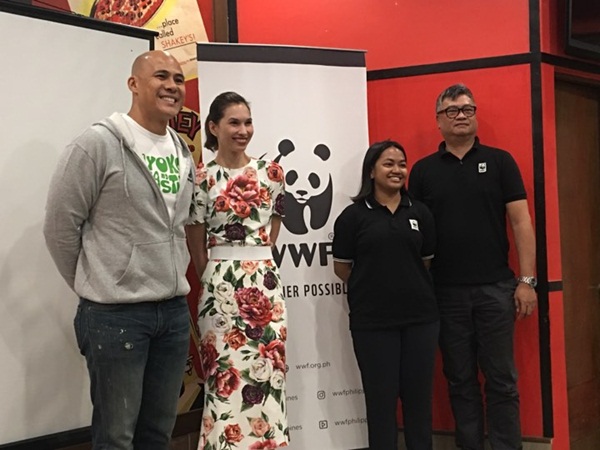
Rovilson Fernandez National Ambassador WWF Philippines – Nanette Medved Po Chairwoman / President, Generation Hope Inc. – WWF Philippines Team including President and CEO Joel Palma
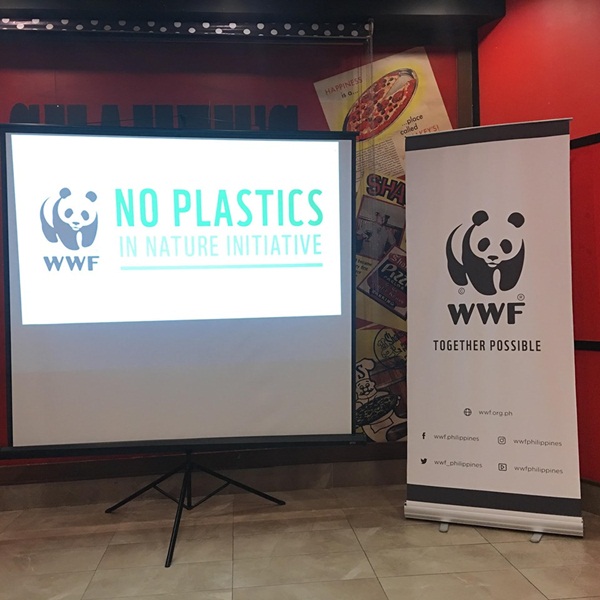
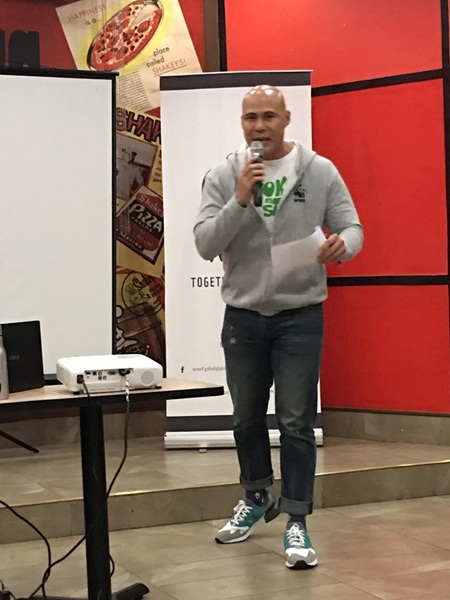
Rovilson Fernandez – Fil-Am Model and WWF Philippines National Ambassador hosted the event for WWF #AyawKoNgPlastik
The problem with plastics has been escalating for decades, where the Philippines has been identified as the world’s third largest contributor of plastics in the ocean. Plastic pollution has always been a huge issue in the Philippines with the continuous generation of plastic wastes and poor waste management.
In 2016, global plastic production has reached 396 million metric tons, which translates to 53 kilograms of plastic per person on the planet.A third of this number has already become land or marine pollution and with a projected increase of 40% by 2030, an additional 104 million metric tons will leak into nature in a business as usual scenario. This poses harmful effects not only to our environment, but to human health as well. It is estimated that on average, people could be ingesting approximately 5 grams of plastic every week.
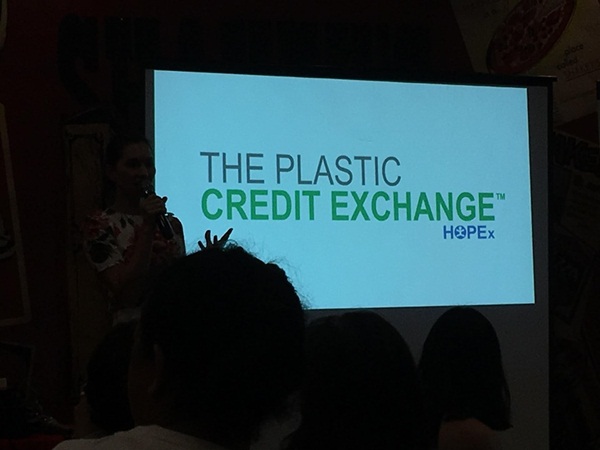
Nanette Medved Po Chairwoman / President, Generation Hope Inc. talks about an ongoing project that will encourage locals to help in segregating plastic from the sea and earn money from it – The Plastic Credit Exchange
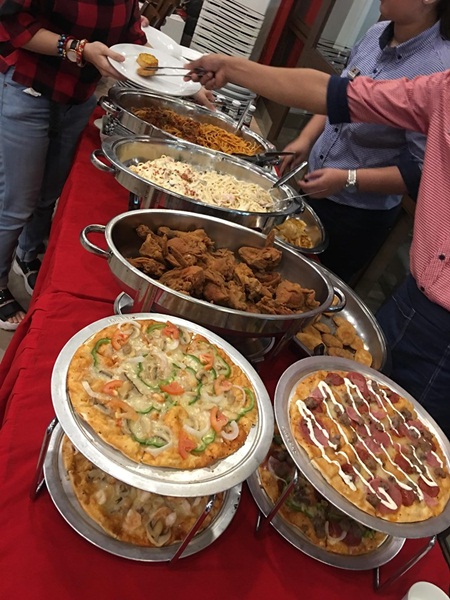
Shakey’s Philippines is one of the newest partners and supporters of the #AyokoNgPlastik movement. Shakey’s was the venue partner and food sponsor during the event. As Shakey’s supports the No Plastic Movement, their restaurants implement strawless drinks and no plastic balloons in parties.
Recognizing the threat brought about by plastic pollution, WWF-Philippines rolled out the #AyokoNgPlastik movement last year in hopes of addressing the issue by creating awareness among Filipinos to reduce dependence on single-use plastics such as straws, bags, bottles, and cups, among others.
This year, WWF-Philippines reinforces their campaign against unnecessary plastics by adopting the ‘No Plastics in Nature’ Initiative, a global WWF approach that intends to stop the flow of plastics entering nature by 2030 through elimination of unnecessary plastics, doubling reuse, recycling, and recovery, and ensuring remaining plastic is sourced responsibly.
“With the ‘No Plastics in Nature’ Initiative, we are hoping to make the Philippines free of unnecessary plastic wastes, but we cannot do this alone, we need the help of everyone. Every individual, company, and institution should be mindful of the amount of plastics they produce and use daily, and take action accordingly, to make this goal a reality,” said Joel Palma, WWF-Philippines President and CEO.
The initiativeis a holistic approach consisting of four main strategies
1. lobbying for a global legally binding agreement on plastic pollution
2. PlasticSmart Cities movement forcities and tourism destinations
3. Plastic Action (PACT) for businesses
4. #AyokoNgPlastik for the general public.
The WWF network is continually pushing for a new international legally binding agreement to comprehensively address marine plastic pollution throughout the full life cycle from both production to disposal and recovery back into a circular loop. This is the network’s response to the agreement made at the recent 14th Conference of the Parties to the Basel Convention (COP 14) in Geneva, which stresses that the developing world could no longer be a plastic dumping ground and that any trade would require theprior consent from the receiving country.
PlasticSmart Cities, on the other hand,is a global movement of cities and tourism destinations that are fighting plastic pollution through improved collection, recycling, reduction of key waste plastics, and landfill management. Currently, the Philippines is working in sixcities including Davao City, Digos City, Tagum City, Manila City, Parañaque City, Island Garden City of Samal,and four municipalities including Lupon,San Isidro,Sta. Cruz, and Donsol.
Meanwhile, WWF-Philippines was able to partner with at least 20 businesses for the sustainable journey movement where programs to reduce or eliminate single-use plastics in their supply chain system, workplace, and business operations were implemented. This program resulted in the prevention of over 1.5 million pieces of plastic waste from leaking into nature. Currently, WWF-Philippines is adopting the Plastic Action (PACT), which is a regional initiative on engaging businesses to take ona circular economy.
Finally, WWF-Philippines’ successful #AyokoNgPlastik movement will continue to educate the general public about plastic pollution, its impacts, and how people can help in addressing it through the Facebook community and the recently launched AyokoNgPlastik microsite. Members of the movement have also demonstrated their commitment to this cause by signing the petition to support the call for a new legally binding international agreement on plastic pollution.
“The problem on plastic pollution will only continue to worsen if we don’t do anything about it. We are determined to address this issue to ensure that there will be no more plastic pollution in nature by 2030, and we hope to achieve that through the ‘No Plastics in Nature’ Initiative,” Palma reiterated.
WWF-Philippine’s ‘No Plastics in Nature’ Initiative was launched on the 5th of September at Shakey’s Quezon Avenue. Shakey’s Philippines is one of the newest partners and supporters of the #AyokoNgPlastik movement.
To know more about WWF-Philippines and the ‘No Plastics in Nature’ Initiative, visit www.ayokongplastik.org or follow /WWF.Philippines on Facebook. To engage in conversations on plastics, join facebook.com/groups/ayokongplastik.












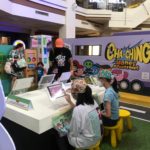



This is a great advocacy..we really need to save the environment
Yes. People should really practice using PLASTIC.. thats our Hope and wish someday.. Oneday.. Wala na talaga Plastic.
I’m starting to use metal straws and bringing my own grocery bags to at least help reduce the plastic waste. I also explained this issue to my kids.
Making a constant effort to reduce plastic use in our household. Baby steps but it mean a lot in the long run 🙂
The use of plastic and of course, the “basura” problem not only in our country but around the world is really, really alarming. We should really be mindful of using too much disposable bags and such.
It’s amazing when organizations take a great lead to help the environment such as this. More power to WWF-Philippines!